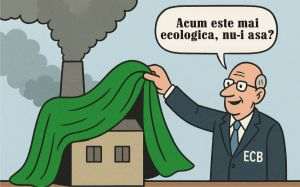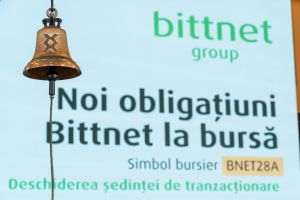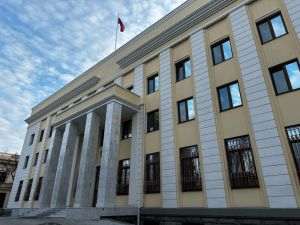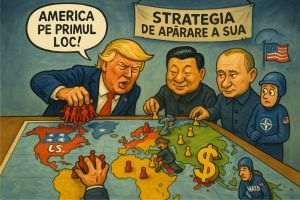Reporter: Lately, several employees of ASF have resigned or been fired. I would refer to Mr. Ciprian Copariu, who oversaw the capital market for almost 20 years. What is the reason for those departures? Are they related to the oversight failures you've talked about before?
Nicu Marcu: I don't know if there are any oversight failures, but it's true that I'm a tough person and I push until people do their job. In the case of Mr. Copariu, the decision to leave the ASF came from him - he requested the termination of the employment contract by mutual agreement of the parties, and I respected his decision. My interest is to be as transparent as necessary to comply with the law.
Reporter: What was the situation in ASF like when you took over the management of the institution?
Nicu Marcu: The authority was in a state of instability, and the market was in a state of turmoil. I thought things through very carefully when coming here. And I thought to myself I would come in to do reformation. I did not come here for the salary, because there is this constant issue of wages. My opinion is that it is non-issue and I will tell you why: I did not come here for the salary, I did not come for anything else than to make this Authority a strong institution. I'm not interested in staying three terms, five terms. As long as I stay, I want to make a strong institution, to have it be a unified institution, not three institutions in one.
When we started this unification process, the Authority was functioning as three different entities - the capital market had its own procedures, with audit procedures, with licensing and so on, the private pension market has its own, as did the insurance sector. It doesn't have to be like that.
If we want a strong Authority, it must operate according to unique principles and procedures. This Authority should have approximately common and differentiated procedures specific to all three markets it regulates. If we treat the three markets differently, this only makes the work more difficult and does not create coherence for the processes of the Authority.
Those two processes that we need to consider are very serious: oversight and audit. Until I get to audit, the essential role that the Authority has is to oversee, and the oversight happens all the time, every day.
We need to constantly know what is going on in the companies we supervise so that we are able, at an appropriate time, to make a decision, so that the market is balanced and there is legal compliance. In this context, after a certain period of time, after five or six months, because about six months have passed since I came here, I have made the decision - not just me, but the Board of Directors - to execute this reform of the Authority.
This reform is based on a very broad analysis, which was done by a group of specialists within the Authority, appointed by the Council a few months ago, and this analysis was done only in the area of human resources. Most people are wondering what is happening at the ASF. Some people are being replaced and some people will be replaced, but that is not the point.
We are interested in having a unified process, a process that ensures more decision-making consistence, so that the decisions that are made here get made much faster and in an informed manner.
A general directorate will be created in each sector, and that general directorate will take over all the functions that the two-three directorates that each sector used to have, and will be led by a general director who will integrate all the information and all the decisions made, on the basis of the information it integrates from the Directorate-General.
Reporter: Will the managers of the new departments be appointed by you?
Nicu Marcu: Not by me, by the Council. They will be selected following a competition, please take note! It will be a public contest, it won't be Nicu Marcu coming in pulling some names out of a top hat. Until then, until the competition - which will take place very shortly, probably in late February, early March - someone will be appointed as an interim position. But there will be a public competition and we hope to select the best people to manage those General Directorates.
Reporter: Last week (ed. note: two weeks ago) there was a complaint that appeared in the press about the National Anti-Corruption Department (DNA) against the management. Can you give us details on the matter?
Nicu Marcu: Some paper wrote that an employee filed a complaint with the DNA. We don't know who that employee is, I've read that article and know just as much as you do. I am not a cop to conduct investigations, who filed the complaint, what they did... In the informal meeting I had with the press I said the following: anybody who has any complaint to make - an issue which could concern a criminal matter - is free to go to the prosecutors, because they are the institutions competent to work on such issues. Therefore, if anything of the kind exists, the Prosecutors' Office needs to perform a review and to announce a solution.
Reporter: If we also look at the notification made to the DIICOT, it looks like at the ASF there is a kind of internal war between management and employees.
Nicu Marcu: Our press release came before that article was published. It has nothing to do with it, there is absolutely no war between the management and the employees of the institution. The article alleges that he is an employee. You can't extrapolate, it is supposedly an employee. I can file a complaint against you myself, and so can you against me...
Reporter: There has been talk of some intentional errors in certain documents. How is it possible for documents to be amended in a state institution so that certain companies can sue the Authority and win the case?
Nicu Marcu: I have no way of knowing if things are done intentionally or unintentionally. There may be mistakes during work, it may be something else. The point is, these things have stopped.
In order to avoid these things, protect myself and to further avoid these things along the way, during my time here, I have created a compliance group that analyzes the compliance of the documents so as to make sure that they are all identical.
Because we do not have common and very clear procedures, we do them in the meantime ... We have worked and we have created the Unified Audit Regulation, meaning that all of the three sectors will be working, will be going on an audit, on the basis of a single unified regulation.
It is not okay to start an audit action and have it take more than a year, because the information is already out of date by then.
Now, through the new audit regulation we have set very clear delays: you wen in on so and so date..., you left on so-and-so date... From the latter, you have a specific delay to produce the audit report and submit it to the Council, for every measure you have over there. It's not OK to have ten audits launched and not even finish one of them...
Start an audit here, wait for the minutes to get done, start another one over there, wait for the minutes for that one... No, I'm telling you honestly that I borrowed from the methodology of the Court of Auditors which I have transposed at the ASF, given the specifics of the institution. We still have a few things to do and they will get done, we will finish all these procedures on the audit side and then I think things in that area will be very well established. And, I told you, let's not forget the oversight process, which is extremely important to us. Oversight gets me "ammunition" for audits.
Reporter: Did that complaint brought to the DIICOT include issues from the stock market or does it only mention the insurance sector?
Nicu Marcu: I can't give you details. There are things that I, even if I want to tell you, I can't make public because that would mean creating turmoil, and it's not okay. We have a permanent collaboration with the prosecutor's offices, with other institutions, because that is the nature of our activity. But obviously, when we have suspicions, we also address the institutions.
Reporter: In connection with those internal investigations into the irregularities in the capital market sector, more precisely in the situation of the SIFs, there were some rumors that some of the employees allegedly covered each other's backs in those investigations...
Nicu Marcu: No, no, what we have communicated to you, because you kept asking us on those issues, those are the conclusions; nothing else.
Reporter: You have been president of the ASF for six months. What was your understanding of the conflict situation at SIF Oltenia in October? It was a very confusing situation, the financial statements were rejected in a later General Meeting of Shareholders, after the one that approved the balance sheet, as well as the dividends, which had previously been approved and partially paid out...
Nicu Marcu: I understand a lot, but I would like to ask you not to get into technical issues related to certain markets. You have often asked us for things related to the issues that have interested you, and we have answered you to the extent where we were allowed to, so as not to create disruption in the market. As you know, at the moment, things are as they are in the market and the market is stable, let's leave it at that ...
Reporter: But there are still certain situations left somewhat without an ending, at SIF Oltenia ...
Nicu Marcu: You will see them later, and you must get your information from the BSE website and the website of the Financial Oversight Authority. If I they are not to your satisfaction, then you can contact me and the institution at that time.
Reporter: However, I also have to insist with a question related to the situation in which SIF1, SIF4 and other 11 funds financed by the two issuers reached a stake of about 35% in SIF Oltenia. Do you have an opinion on that action in concert? Why was there no representative from the ASF in the respective General Meeting of Shareholders, from October 12, to oversee the operation?
Nicu Marcu: Personally, my opinion is irrelevant. You have received the official answer from us and, in order to avoid any misinterpretation, I will provide you with material in this regard (see insert).
If no incidents have been reported and everything went smoothly (ed. note: at the General Meeting of Shareholders in October), it means that we did our job. That's my take ... You know how the Authority, the sector, are organized: the legislators say the following, when they appoint the nine people in charge of the Authority: vice-president are appointed, to be in charge of the insurance sector, the stock market sector, and the private pensions sector. So my colleagues in charge of the stock market sector, I know that they have always informed you, because you have always asked them, and I have asked them to quickly give you all the information you need to be informed. To the extent where there is legal compliance, let's not do anything else, because I don't want to upset the market.
Reporter: Regarding the development of the capital market, what is your target in these three years of your term?
Nicu Marcu: If I tell you now that I intend to double the weight of the stock market in the GDP, you will say that Mark is starting to talk fiction. First of all, I want us to know which way we are going.
First, let's scan, let's know exactly where we stand, what is our current status and see the direction we are headed in. In that regard, you know very well that a national stock market strategy is being worked on.
By us, together with the Ministry of Finance, under the advice of the OECD, and you know very well that the OECD has an extremely important expertise in that regard.
The work has already begun. The OECD, as a consultant, is already analyzing the market with players involved, with NGOs, through questionnaires, debates, market players, so as to have a very clear image of the Romanian market.
A relevant material will be done by June this year, which will highlight all the necessary aspects, strengths and weaknesses and so on, with proposals so that we, by the end of November, will have already established, completed, the strategy for the stock market.
My opinion is that with the transition to the emerging market status, Romania has some extremely important benefits given that large investors are now allowed to come to Romania, to enter the Romanian market, because, as we see, Romania has sufficient liquidity.
There is a need for assets to invest in.
But we still have a backlog, but something which I hope will no longer be so: we still have to make the Central Counterpart. And this is ongoing, the BVB is working on the Central Counterpart, together with advice from the ASF. I want to tell you that we have had an informal meeting every month with the Stock Exchange, so far.
Since coming in, I have started some monthly meetings with the Stock Exchange and, on the insurance side, with the insurance companies in the market.
For a month now, we have increased that scope and I have proposed that, in addition to the Stock Exchange, the SIFs come in for meetings, they are online. And we will include other investment funds, at a higher level, so as to make sure that we know what is going on in the market, that we know their wishes, while also letting them know what Authority wants, so as to make sure that The authority will be doing monitoring much more effectively and deliver to the market what is needed.
It is a permanent consultation.
Reporter: I would assume that strategy also includes a number of measures, aside from listings, respectively some tax breaks... There was also talk about those occupational pensions...
Nicu Marcu: Yes, in the case of the occupational pensions I spoke personally with the former Minister of Finance, the current Prime Minister, who understood that aspect very well and at that time even promised that when amending the Fiscal Code he would take it into account, because he understood the importance of occupational pensions. As long as you give employers a tax break, you lead them to approach the area of occupational pensions. And my opinion is that, having an alternative to public pensions, i.e. having the second pillar, which is mandatory, the third pillar which is additional, optional, and the occupational pension pillar, then the citizens, the contributors, have a much greater security upon retiring. We have one more thing to do this year, you know very well that the payments from 2nd pillar have started. We already have young retirees, i.e. they have started to retire based on the second pillar: currently full payments or annuities are being made, i.e. all the money has been given or is spread out over five years. We want to have the law of payment through which we can pay pensions over the course of life. In the sense that they pay a monthly pension so that the money left in their accounts is capitalized and increases. On the pension side, we have to issue regulations this year.
We have a problem in the insurance sector as well. It is unacceptable, with all the wide range of insurance products, to cling for years to a social product, the RCA insurance policy. That does not happen in any other country. That product is not attractive for a business. Because its yield is not that great. That product has caused dissension due to regulation. So the regulation on RCA at the moment is deficient. In this regard, at the level of the Authority, we have tried three directions of action. First of all, because the law on RCA policies has been stuck in the Parliament for about two years and no progress has been made, we tried and talked again to the former Minister of Finance, the current Prime Minister, to promote an emergency ordinance with direct settlement, and the amendment of the RCA law in terms of direct settlement, in the sense that I, if I buy insurance from an insurer, they are required to pay my damages. That is, the consumer, respectively the insured, is protected. Once that is done, the matter was resolved. I'm talking about the actions steps I've taken since I've been here.
On a different note, an internal regulation that we made, to make sure that whoever has market share also has liquidity - we changed a rule that had been up for public debate and is now being implemented, and needs to be so by March 31st, meaning that whoever has a significant market shares also needs to have money. That is, we have asked the companies that want to have a large market share to get capitalized and come up with money (by the end of March).
The third direction I went with is the audit and oversight. As I was telling you, the oversight was - I think - somewhat deficient. I've said it very clearly: I want to know the full picture of companies in the market, at any time.
Astăzi, mâine, poimâine, nu să întreb astăzi şi să-mi răspunzi peste o săptămână, o lună de zile, ce se întâmplă în piaţă. În sensul acesta au fost stabilite nişte controale periodice anul acesta, eu am mărit plaja de control: se controla pe trei luni şi am zis nu, extindeţi pe şase luni de zile perioada de control, adică controlezi documentele pe şase luni.
Today, tomorrow, the day after tomorrow, rather than ask today about what is happening in the market and get the answer in a week, or a month. To that end, some regular audits were established this year, I have increased the scope of audits: the audits had a three month scope, and I decided to extend the audit range to six months, i.e. ask for documents going back six months when doing an audit.
Of course, I cut back the delays so that audits would be completed within a reasonable timeframe, not in a year and a half as I've seen it happen previously. There were some results of the audit, you've seen some measures get taken, there were sanctions levied in the market, both on individuals and legal entities. Personally, I support a balanced and fair market in Romania.
Whoever makes a mistake, has to pay. Meaning they get sanctioned. As such, I leave no room for interpretation in any market and I have made it very clear to all market players to become compliant, if they are not already. Because any illegal behavior will be constantly sanctioned. And the sanctions will happen gradually.
Reporter: Regarding what you are talking about now, I am reminded of the episode with SIF Imobiliare, in which a market player is in violation of the law or violates the law and sends the market false signals...
Nicu Marcu: If I remember correctly, at that time you sent us some inquiries and I answered you every time on this matter. I would not like to go into detail on this, but I can send you an analysis of the sector on this issue, so that you can get a clear picture and have information that you need.
Reporter: What about employees or advisers appointed via their political connections? It is a habit that dies hard, in almost every state institution...
Nicu Marcu: There are no more advisers, they have been dethroned. First of all I have eliminated the positions of cabinet advisers, we have appointed them as experts and we reduced their salaries substantially, because there were too many of them, we appointed them as experts and we reduced their salaries substantially...
Reporter: By how much?
Nicu Marcu: By a lot. The positions of cabinet directors were abolished and they were converted into coordinators, of course with reduced salaries.
You will see that in the future wage grid for the management of these Directorates-General, although it is headed by a Director-General, the salaries will be much lower, and you will have the appropriate information about that.
I want to create a wage grid in the coming period so that it is fair for every employee of this institution.
In the sense that the staff that carries the brunt of the work in this institution are the three sectors and it is fair for the people who work in these sectors to be paid in a unified manner and based on some standardized and fair principles so that they are not frustrated that they haven't seen a raise in five or seven years. My challenge is that the moment I leave here, no matter who comes in after me, they won't be able to mess things up anymore. (...) And to answer the question on political advisers, you know very well how the Labor Code works.
I'm not some kind of hunter, coming and looking at people, "who are you", "who brought you in", and so on. Since I came in, everyone's been busy. I said, "Every man has a chance in life. Get to work! If I catch you slacking off, then all bets are off".
While I come in at eight and leave at 9, I don't expect them to stay with me in there, but during those eight hours, they must do their job. We aren't allowed to waste time. At the same time, when it comes to wages, since there was debate that they are high and so on, it is not true. They are not as high as has been claimed in the press. I will make available to you the compensation packages for our employees.
Reporter: The press got them from the financial disclosures...
Nicu Marcu: Yes, it has been written about me that I have a salary of 20K euros. I don't, it's a little over 11K. Does that salary, my salary, seem small or big to you, compared to the responsibility I have here and the scope of the markets that we oversee? Leaving aside my income, which is comparable to the income of many state secretaries in ministries or agency presidents, in terms of the salaries of employees in the institution, I personally agree that these salaries should be reasonably high, because they oversee a very large market and have a very big responsibility.
And, on a different note, if I don't incentivize those working here, they will leave to a company in the market sooner or later, because they get offered a better salary because they know somebody, they know the law, they know the job, and then who else do I have to work with? That is why the legislators said the following: it is an institution that is autonomous, that is self-financed because that is how the legislators set it up, and then by default it sets its own salaries, it is set in the law, just like the NBR does. That's what our law says, the Parliament made it.
Reporter: Do you expect you will have more than one term or not?
Nicu Marcu: I have never made it my goal to come in and try to force things in order to get another term. I have to stay here as long as I want to do a job, to create growth. I have the following opinion: the more the succession of the leaders is more frequent, the better the innovation. Because after a while you get used to the institution. You have nothing new to offer, maybe you can't even see new things. But if new people come in, then they bring in a different vision, with something else. We mustn't cling on.
Reporter: You were voted by the Parliament with a wide consensus, by the PSD and PNL alike, for reform, cleanup, reorganization. Will you be reporting to the Parliament on this process?
Nicu Marcu: Yes. In a very short time. Meaning, hopefully a month at the most. Including with legislative proposals, with everything I did. Across of the three components. I am extremely blunt. I'm not stuck on any job. I'm not going to beg for positions. If they think I'm the right person to do what I have to do here, yes. It is not considered ... I did not get here through a competition. I was heard by the parliamentary committees, and they voted for me, the whole Parliament did. Parliament can also decide otherwise if you do not reach the goals you were sent in to achieve. So as such, as long as I'm here, I'll do the job.
Reporter: Thank you!
In connection with the situation at SIF Oltenia, the communication department of the ASF sent BURSA a response, stating that, following the analysis of the Authority, no elements / data were identified which would lead to the conclusion that SIF1, SIF4 and the other 11 investment funds acted in concert in connection with SIF5, which would require them to make a takeover bid.
We hereinafter attach the full answer of the ASF:
"Given the issues mentioned in the Current Report published by S.I.F. Oltenia S.A. on the BSE website on October 7, 2020, related to the address no. 6071 / 06.10.2020, communicated directly to the ASF as well, following the analysis performed on the data and information available, no elements / data were identified which would lead o the conclusion that the respective persons / entities, mentioned by S.I.F. Oltenia S.A. in the aforementioned document, acting alone or in a concerted manner, are subject to the provisions of Law no. 24/2017 regarding the issuers of financial instruments and market operations, applicable in the matter of takeover bids.
Also, the analyses performed on the data and information available, in order to investigate the obligations established by Regulation no. 3/2016 concerning the applicable criteria and the procedure for the prudential assessment of acquisitions and increasing stakes in entities regulated by the Financial Oversight Authority did not reveal situations that would require the application of the provisions in question.
The result of the analysis performed was brought to the attention of the S.I.F. Oltenia S.A. on 15.10.2020, via the address no. VPI / 10894".
---------------------------
ASF oversees three markets that, cumulatively, account for 12.5 - 13% of the GDP. According to Nicu Marcu, the goal would be for those three sectors to reach 20% of the GDP: "Our ambition and not just ours, but also of the government, with all the entities, and of the market, must be to increase the share of this non-bank financial market to be a counterweight to the banking market, or perhaps not necessarily a counterweight, but to be another - if we think of the capital market - source of financing for companies. Financing and borrowing costs for companies will also automatically fall, given that there are two sectors that can finance companies: the stock market and banks".












































